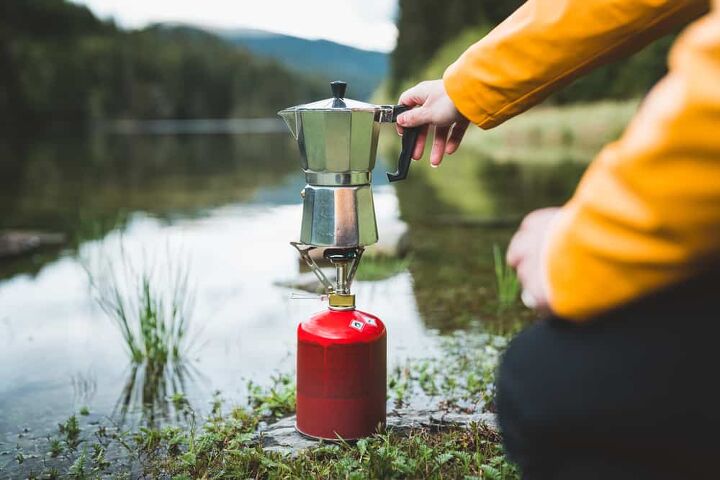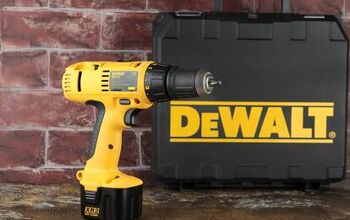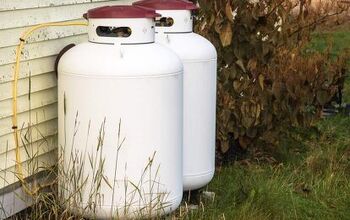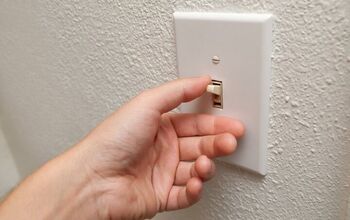How To Dispose Of 1lb Propane Cylinders (Easily & Safely!)

Everyone has used them at one time or another. We are talking about the ubiquitous green propane cylinders that are popular for fueling camp stoves, lanterns, and tent heaters. The problem is how to dispose of these 1lb propane cylinders when they are empty.
To dispose of 1lb propane cylinders, contact the original supplier, or take them to your local hazardous waste collection center. You can also call other local gas providers to see if they will dispose of them for you. However, make sure you never throw them away in the regular trash.
In some areas finding a suitable disposal method for one-pound propane bottles can be a challenge. There are ways to recycle them for these one-pound propane cylinders for the steel they contain.
Do You Need Waste or Junk Removal Services?
Get free, zero-commitment quotes from pro contractors near you.

How To Prepare A 1LB Propane Bottle For Disposal
Preparing a one-pound propane bottle to go to the recycling center is easy.
- Empty the bottle completely. Attach the bottle to your camp stove or lantern and attempt to light the stove or lantern. If the stove or lantern will light, let the propane left in the bottle burn off until the flame goes out.
- Remove the bottle. Remove the empty one-pound propane bottle.
- Head to the recycling center. Take the one-pound propane cylinder to the appropriate recycling center.
Can I Refill A One-Pound Propane Bottle?
There are adapters on the market that claim to let you safely refill a one-pound propane bottle from a larger tank.
The truth is that those green one-pound propane bottles were never designed or manufactured for refilling. Trying to reuse a one-pound propane bottle can be dangerous.
Understanding Pressure Cylinders
The bigger and refillable propane tanks must meet strict guidelines on materials, manufacturing, and testing. If you look at the larger tanks, you will find markings and numbers stamped near the valve at the top of the cylinder.
The markings and numbers indicate when the tank was manufactured and, most importantly, when the tank must be reinspected and tested before continuing in service. Each time your propane provider refills one of your propane tanks, they must check the date.
The Problem With One-Pound Cylinders
One-pound propane tank design and manufacturing is for single use. The material used to make these single-use tanks is thinner and not meant to withstand repeated filling stresses. The seams and valve openings can fail, sometimes catastrophically.
Rust and corrosion is a major problem. Water vapor can condense inside the cylinder and corrode the metal, making it more prone to leaks or failure. You cannot see this corrosion from the outside. It may only become apparent after the cylinder has failed.
Valves And Overfilling
One-pound propane bottles do not come equipped with valves designed for refilling. These small cylinders’ valves do not have bleeder ports to indicate when the refill is complete and the propane is at the proper level. Overfilling can occur rapidly with explosive results.
The Legal Issues With Refilling
There are no federal or state prohibitions about refilling one-pound propane cylinders. Technically, you can refill the cylinders without legal worries. The problem is then transporting these refilled tanks on your next camping trip.
It is improbable that you will get stopped for a refilled tank inspection. However, should an accident occur, and a refilled tank is involved in that accident, you may run afoul of the Department of Transportation rules regarding the transport of filled small cylinders.
The DOT rules prohibit the transportation of refilled small cylinders. Get caught, and the fine can get as large as $500,000 and five years in federal jail.
What Options Do I Have To Refill Propane Bottles?
At least one manufacturer addresses reusing one-pound propane tanks by building and selling a refillable system to replace the little green tanks.
It may be time for responsible propane users to consider investing in one of these systems. Refillable tanks can relieve the problems that one-time use propane tanks have caused.
These small refillable tank kits come with a stand that safely holds the 20-pound cylinder upside down. An adapter connects the refillable tank to your larger propane tank. The refillable one-pound tank also has a bleeder valve and a refill valve to make the whole process safe.
You can find more information on these refillable on-pound propane bottles at this link.
The Problem With Propane Bottles
The problem with disposing of one-pound propane bottles is the residual gas left in the bottle even after it will no longer run your stove or lantern. However, there is still propane vapor left inside the tank. This small amount of condensation can pose a danger if not handled properly.
There are numerous accounts of one-pound propane cylinders sparking fires and explosions in garbage handling facilities across the country.
The danger to workers can be considerable. This danger is the reason much local recycling and garbage handling companies will not accept one-pound propane cylinders.
Some states now class empty one-pound propane cylinders as hazardous waste. Anyone collecting and disposing of one-pound propane bottles must be certified, and in some states, licensed.
Are Disposable Propane Tanks A Problem?
There is a bigger problem with disposable tanks. Many people take the term disposable in the wrong way. It is this misinterpretation of the term disposable that causes massive problems in places like parks and resorts.
The propane industry estimates that forty million “disposable” one-pound propane tanks are sold in North American annually. These small tanks get taken everywhere. They show up at the beach, in parks, and in RV resorts. It is what happens; next, that is the major problem.
The Disposable Conundrum
Too many people take the word “disposable” literally. For instance, Yosemite National Park collected over 23,000 discarded one-pound propane cylinders in 2014. It costs approximately one dollar for the park to manage these discarded cylinders.
Other parks in the National Park System have similar problems. Management costs across the system range from $1.00 per cylinder to over $3.50 per cylinder. Prices vary due to the handling and transportation costs involved in dealing with these “disposable” tanks.
Escalating Costs
The cost of properly disposing of a one-pound propane cylinder continues to escalate as more states regulate the transportation and handle empty bottles. In some instances, empty one-pound propane bottles classify as household hazardous waste.
Only licensed and certified household hazardous waste facilities can handle empty one-pound propane. These companies and facilities do not operate for free.
In some areas, the cost to have these left behind empty one-pound propane cylinders effectively managed can be $7 to $8 each. It is easy to see why many parks and resorts are coming under increasing economic pressure because of one-pound propane bottles.
What Can You Do To Help The Situation?
You can make some simple changes in your community and in your consumer habits that can help stem the problems with disposable one-pound propane tanks.
- Switch to refillable one-pound propane tanks
- Dispose of your leftover one-pound cylinders correctly and responsibly
- Don’t toss empty cylinders in the trash, especially at parks or resorts
Acting responsibly can help the environment, your parks and resorts, and your local community by promoting safe practices and properly managing empty one-pound propane cylinders.
Do You Need Waste or Junk Removal Services?
Get free, zero-commitment quotes from pro contractors near you.

Our Takeaway
The more significant problem is more than just finding a way to get rid of that empty one-pound propane bottle from your last camping trip.
The costs to you and your community to safely and adequately handle these tanks continues to grow. The goal should be to eliminate the concept of “disposable” and move toward “reusable.”
We hope that this article has answered your questions about the proper disposal of empty one-pound propane tanks. Our goal is to give you the best possible information. Be safe.
Related Questions
Are Coleman tanks safe to throw away?
Coleman introduced their “Green Key” [program in 2009. The concept was to provide a way to make one-pound canisters safe to toss in the trash to go to the landfill. Unfortunately, the program has since gone away.The Coleman Green Key system provided a tool with each one-pound propane cylinder that could open the valve. The green key allowed the remaining gas to escape and locked the valve open. The open valve made the one-pound tank safe to handle, transport, and recycle.Unfortunately, the Green Key concept was never widely accepted by regulators and the waste disposal industry. This lack of support from the waste disposal industry and the recycling industry caused Coleman to discontinue the program.
How do I find a place to dispose of my empty propane bottles?
The best place to start is with your City waste disposal department. Many cities have local programs run by the town to handle household hazardous waste.Enquire about drop-off points and what you need to do to prepare your empty one-pound propane bottles for disposal.If your city does not have a household hazardous waste program, they probably have a list of waste disposal handlers who accept your propane bottles. Many propane dealers will take your bottles, often for free, and dispose of them properly.
Related Guides

Dennis is a retired firefighter with an extensive background in construction, home improvement, and remodeling. He worked in the trades part-time while serving as an active firefighter. On his retirement, he started a remodeling and home repair business, which he ran for several years.
More by Dennis Howard













![The 5 Best Angle Grinders – [2022 Reviews & Buyer's Guide]](https://cdn-fastly.upgradedhome.com/media/2023/07/31/9071326/the-5-best-angle-grinders-2022-reviews-buyer-s-guide.jpg?size=350x220)

![12 Washing Machine Brands to Avoid [with Recall Data]](https://cdn-fastly.upgradedhome.com/media/2023/07/31/9075781/12-washing-machine-brands-to-avoid-with-recall-data.jpg?size=350x220)











